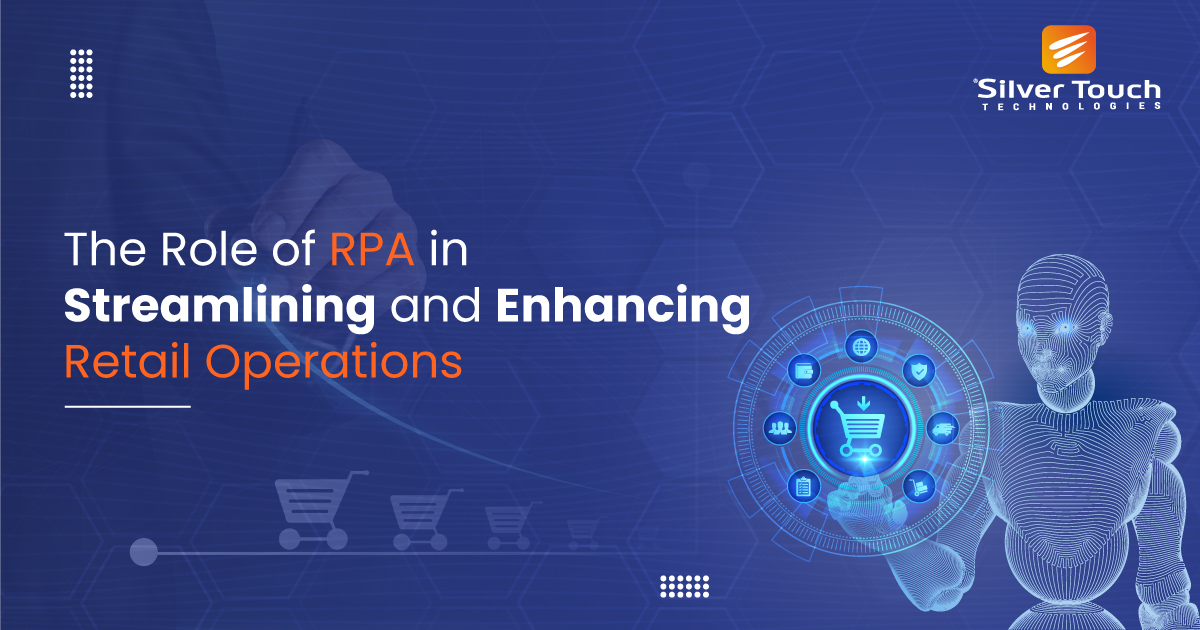The retail industry has experienced a sea change over the past few years. Since the pandemic, there has been a gradual shift towards online shopping. This has paved the way for a complete digital transformation, and the normal brick-and-mortar stores have been significantly impacted because of this transformation. Online businesses have also started to experience numerous challenges, like rapidly evolving customer expectations, demand for quality services, etc. This has again put a huge pressure on the retail sector. There has also been an increased need to adapt to changes quickly. This is exactly where the need for automation in the retail industry has been felt. Here’s a look at how automation has transformed the various operations of the retail industry and how it is poised to influence the sectoral dynamics further.
What is Automation Used for in the Retail Industry?
Businesses in the retail industry no longer rely on manual labour to carry out various business operations. Instead, they turn to automation. This modern approach is completely transforming the standard operating procedure of retail business. This makes sure that companies are ready to adapt to this dynamically changing business landscape. Retailers are also able to respond promptly to changing customer behaviour.
Automation tools like robotic process automation, chatbots, and personalised emails have been driving efficiency in the retailing industry. Robotic process automation in the retail industry has also made the various processes more systematic.
Automation in the retail sector
is rapidly increasing. In fact, the global retail automation market size had a valuation of USD 1,488,500 million in 2021 and is expected to reach USD 3,453,000 million by 2030.The Benefits of Using Automation in the Retail Industry
There are multiple perks of using automation in the retail industry. Here are some of the major benefits:
Reduced Overhead Cost
Introducing automation tools like RPA in the retail industry brings down labour costs. Automation is used to handle repetitive, time-consuming tasks. This not only makes it easier for retailers to manage their business operations but also reduces the overall expense of business processes drastically. Human intervention is no longer needed to carry out every single task. So, we can say that introducing automation in retail stores will give business owners better results with fewer resources, thereby cutting down on operational costs.
Enhanced Operational Efficiency
Robotic process automation in the retail industry allows retailers to come up with the fastest and the most accurate way of completing a particular task. That way, they are able to run their businesses more efficiently. Irrespective of the number of processes they are required to handle, everything is done on time. With automation, human error is reduced significantly. Also, fewer steps are required to complete a task. This results in a faster ordering and returning process. The service consistency is also improved.
Reduced Human Errors
While it is impossible to eliminate human error from the retail industry, the frequency of errors is easily reduced by using automation. Most human errors occur because of fatigue or distraction. These mistakes can be avoided by automating the repetitive and manual tasks. Automation technology also adds a layer of accuracy in reporting, billing, and inventory management. The time taken to perform such tasks is also reduced.
Improved Customer Experience
Implementing automation in retail businesses helps increase customer satisfaction levels. This is mainly because of personalised marketing, prompt services, and on-time support. As per data, around 75% of customers are more likely to make repeated purchases from a company that offers personalised services. In this way, retail automation allows businesses to improve their customer base and enhance customer engagement.
Increased Scalability
Automation allows businesses to scale up to meet their growing demands. Workflow automation in the retail industry boosts sales figures. These automated systems grow with the business and offer essential insights into various business operations. That way, companies no longer have to set up their businesses from scratch, as the business intricacies are easily dealt with using automation tools.
Improved Sales
Enhanced customer service and improved business operations lead to increased sales. Robotic process automation in the retail industry reduces sales cycle duration and boosts business productivity. This drives more sales. As a result, business owners are able to enjoy more profitability. Their retail businesses experience enormous growth within a very short period.
You May Also Like to Read: RPA in Manufacturing Industry: Benefits, Use Cases and Examples
Essential Components of Retail Automation Systems
Here are some of the major components of automation in the retail industry:
Inventory Management
Automated inventory management systems allow retailers to achieve supply chain optimisation. Managing inventories comes with multiple challenges, like forecasting demands, maintaining effective coordination, managing perishable goods, etc. All these problems can be dealt with using robotic process automation in retail. Advanced algorithms and data analytics used in automation optimise inventory levels. Automation tools can also provide access to real-time data on customers. This enables for better management of inventories.
Point-of-Sales Solutions
PoS solutions leverage the power of wireless technologies to help retailers manage their stores in multiple locations. The systems facilitate cost savings. They also eliminate the need to update data manually. The point-of-sale solutions maintain dynamic pricing policies. The systems are effectively used for real-time monitoring of inventory levels and sales figures. PoS solutions also help customers during the checkout process, thereby enhancing customer loyalty.
Customer Relationship Management Tools
CRM tools help retailers drive business growth and increase customer satisfaction levels. These technologies help business owners analyse customer data, improve customer interaction, and also offer them a personalised experience. CRM tools monitor social media posts, emails, and phone calls made by clients and customers. This data predicts client behaviour based on demographics and order history so that personalised marketing strategies can be developed. This leads to sustained success over time.
Self-Service Checkout System
How quick will it be if the checkout process could be automated? This saves a considerable amount of time during the checkout process. These days, automated self-service kiosks are being designed in such a way that they offer step-by-step guidelines to the customer to make the process hassle-free. Security measures are also taken to prevent theft. The customers will no longer have to stand in long queues while paying the bills. Instead, everything is done within seconds.
A Few Use Cases of Retail Automation Implementations
There are multiple RPA use cases in retail. Let us have a look at what these use cases are:
Invoice Processing
Processing invoices is not just time-consuming, but it is also an extremely repetitive task. Retailers are buried under mountains of paperwork. They are also required to spend hours on unproductive activities. This ultimately dilutes the profit. So, using automation in invoice processing has become imperative. With RPA in the retail industry, invoice processing becomes a lot easier. Automated systems collect required information, segregate the data, and process bills in a fast and errorless manner.
New Product Introduction
In retail businesses, new products are required to be launched constantly to keep up with the latest market trends. As new products become available, the old products will have to be updated. The pricing and stock quantities also require to be changed quite frequently. With automation in the retail industry, all these tasks become a lot easier. RPA solutions monitor customer opinion in real time. The data can then be analysed to manage inventories and adjust the pricing and production accordingly. Robotic process automation also ensures that new products are seamlessly launched in the market.
Demand Supply Planning
Based on the demand for a particular product or service, companies need to create a supply plan so that the demands are fulfilled easily. Traditionally, this was done by gathering data, segregating them, and performing other analyses. When executed manually, this required a significant amount of time. With retail automation, the entire process of demand-supply planning is automated. Companies use automation to make data-driven decisions for themselves. This allows for better capacity management. The inventory levels are also managed based on demand-supply planning.
Product Categorisation
Retailers are required to categorise their products based on various criteria. Several factors will also have to be considered while categorising the products. Automation improves the categorisation process. With robotic process automation in retail, business owners can correctly place the products in relevant categories based on various user-related factors. The criteria for segregating the products can also be changed as and when required. This again allows business operations to be carried out smoothly. Retail businesses also prosper at an extraordinary level.
Market Planning
Promoting products and services is an essential part of retail business. However, executing the entire process – manually – is time-consuming. Promotion of products and services involves gathering data and performing an analysis of the sales, which requires a lot of time. Automation in the retail industry is used to complete this task in much less time and with higher efficiency. The RPA system extracts data from multiple sources and performs analysis based on that. This is extremely beneficial for businesses. The business operations are also carried out smoothly.
Ready to Revolutionize your Retail Operations? Embrace the Power of RPA for Efficiency and Growth.
How Can Silver Touch Help Retail Businesses With RPA Implementation?
For RPA implementation in the retail sector, Silver Touch Technologies RPA solution is also is a one-stop destination. With years of experience in the automation industry, the company specialises in designing top-notch RPA solutions for businesses belonging to the retail sector. The experts at SilverTouch Technologies conduct in-depth research on the business requirements and design an RPA solution specific to the customer needs. The RPA solution is also integrated seamlessly into the existing system to minimise business downtime.
Conclusion: Automation in Retail Industry
Automation technology has been recognised as an integral tool in helping retailers streamline their business operations. Automation allows retailers to carry out their jobs precisely and adjust to constantly shifting marketing trends. It also eliminates the need for labour-intensive manual operations. So, if you are willing to introduce automation in your retail business, it is high time that you get in touch with the experts at SilverTouch Technologies and get an RPA solution implemented in the best way possible.
FAQs about Automation in the Retail Industry
Automation can be used to design self-service kiosks, track inventory levels, manage warehouses, etc.
Automation can streamline the various processes in the retail sector. This increases business efficiency to a considerable extent. The business profitability is also increased.





